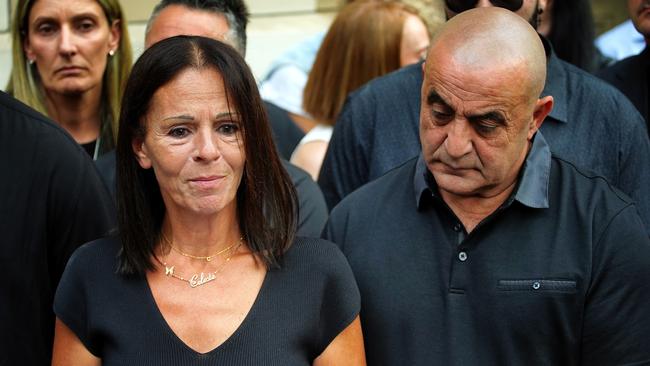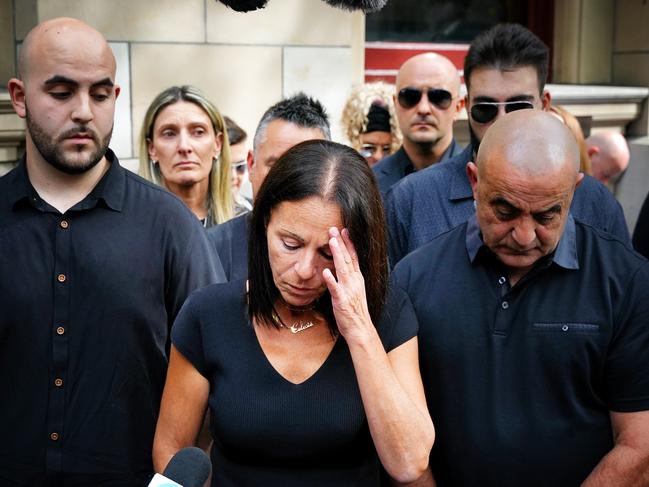Justin Smith: How terrible must your crime be to get life behind bars in Victoria?
A Supreme Court Justice has told a court that the violent way innocent Celeste Manno’s life was ended did not warrant a life sentence. So what the hell does in Victoria?

Opinion
Don't miss out on the headlines from Opinion. Followed categories will be added to My News.
It’s hard not to hear about Celeste Manno without feeling angry tears.
Months before her murder, she was having one of those typical silly mother-daughter arguments with her mum Aggie Di Mauro.
“We can’t go to bed angry, mum,” she said.
“What if something happened in the middle of the night?”
Something did. This beautiful, delicate and kind 23-year-old was killed after a year of stalking and torment by Luay Sako.
After he bombarded her with 140 unwanted messages, ignored an intervention order, tracked down her address, downloaded the home’s floor plan to locate her room, purchased a hammer and a knife, and broke in at 4am one morning when Celeste was asleep, he killed her.
“In the middle of the night.”

Her mother is haunted by those words. And a thousand other details that she’ll never be free of.
So the way our justice system punished the murderer of Celeste Manno was always going to say a lot about our justice system.
Well, we’ve failed. Again.
Yesterday Supreme Court Justice Jane Dixon said the crime, although terrible, did not warrant a life sentence.
It’s left us all wondering just what the hell would.
But it’s left Celeste’s mother destroyed.
“It’s disgusting. I just can’t accept that this person is going to walk free one day,” Aggie said.
A few weeks before the sentence, Aggie reached out to me — terrified that she wouldn’t get justice, and that her daughter’s killer would receive the kind of leniency that Victorian courts have become famous for.
“I prayed to God every night that Jane Dixon would do the right thing.”

Today, Aggie’s outrage and disbelief are almost unbearable.
“How could she hear the detail of this murder and not give him life?”
“If this had happened to a judge’s daughter, would the court still think it was the right punishment?”
Justice Dixon gave Sako a sentence of 30 years non-parole, and with time already served, he could be out a little over 26.
And because of a deal during his guilty plea, he wasn’t convicted of any charges for the break-in, the weapons, or the stalking.
If Sako was hoping for a far better outcome than he deserved, his wishes have come true.
But it’s not the first time this judge has made a controversial decision.
Almost a decade ago, war veteran Ken Handford was hogtied by the cord of his own dressing gown at his home near Ballarat, and stabbed 13 times. It was on his 90th birthday.
Justice Dixon gave one of his killers just 13 years non-parole.


Thankfully, the prosecution appealed the sentence, and the Court of Appeal added on another seven years.
Now Justice Dixon is back in the news.
So now Aggie is saying new prayers. This time it’s to the Office of Public Prosecutions that they appeal the sentence.
“We’re all sick of this,” Aggie said.
“This is not what the community expects. We need the judges to see that. And I need people to be angry with me.”
There’s no doubt that sentencing is the toughest thing a judge will have to do, and compassion and rehabilitation are essential in our courts, but so is community expectation and justice for the victims’ families.
And too often, we’re just not getting it.
But you don’t have to take the word of a newspaper columnist — or even a mother riddled with grief — read Justice Dixon’s judgement for yourselves.
Just prepare to be angry.
Justin Smith is an author and journalist




